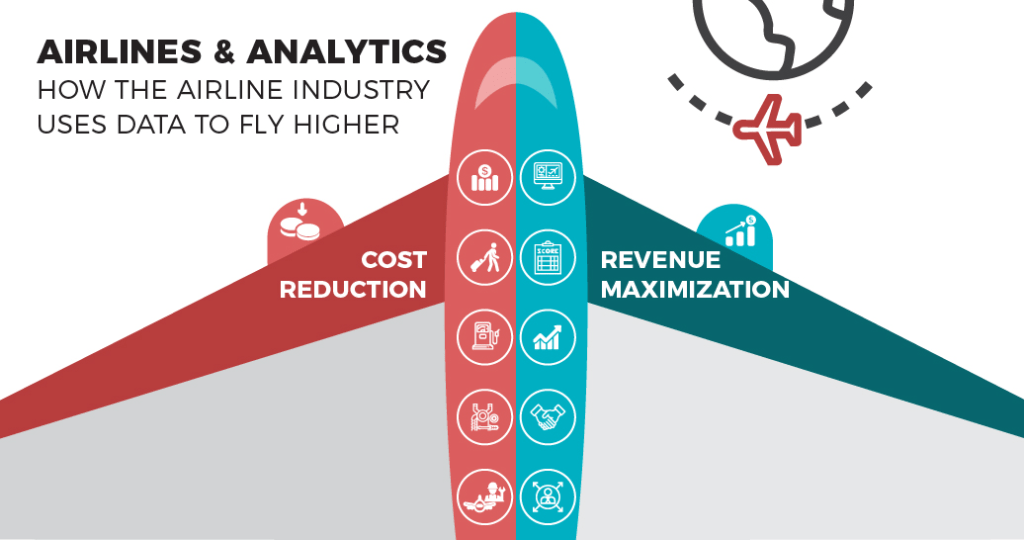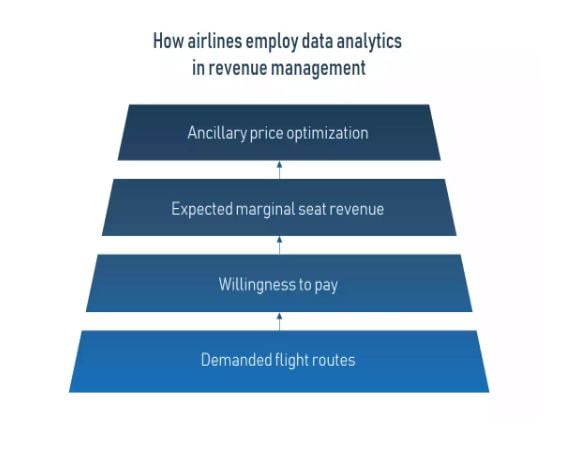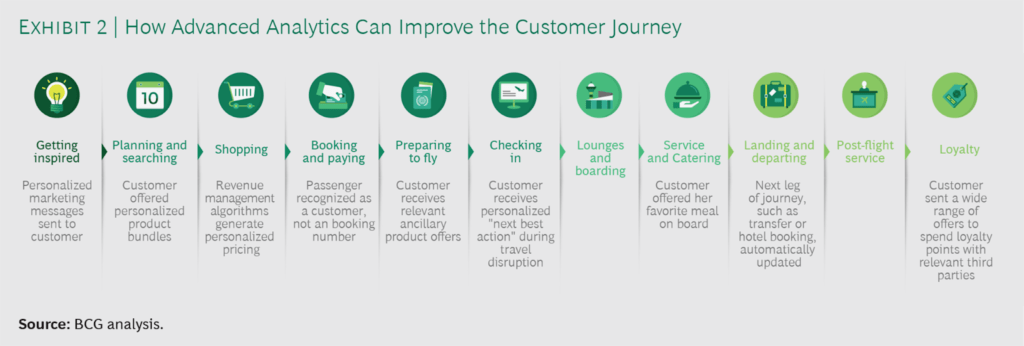The importance of Analytics does not need any debate in this day and age. Everyone understands the value in getting insights from all the data we gather (And also, identifying what additional data we should be collecting for new insights into our business) in different functions. Airline industry is no exception to the notion of deriving benefits from Business Analytics. Airlines capture massive amounts of data in ticket sales, customer service, flight operations, fleet maintenance, marketing, staff management, procurement and many more areas. Let’s analyze the many ways in which these data can be leveraged in different lines of business to gain business value.

- Maximize Revenue and Profitability

The Airline industry has been one of the most financially affected industries during the Covid pandemic. As the pandemic gradually comes under control, it is imperative for airlines to get a grip on Revenue and Profitability. We will go through a few examples below of advantages airlines can derive from by leveraging Analytics.
- Airlines generate a significant amount of ticket sales via multiple partner channels. Getting insight into the composition of airline companies’ ticket sales in comparison to the industry’s ticket sales channels will enable leveraging newer and underutilized channels.
- Visibility into the average ticket sales price vs. the cost of sale and volume of sales will provide an understanding of the profitability across channels. This will help the airline focus on channels that generate higher margins.
- Get an understanding into the optimal ticket sale price for most purchases on each day before the scheduled flight. This will enable increased capacity utilization and maximum revenue.
- Leveraging predictive Analytics, airlines can add and reduce flight capacity for a specific segment where demand is expected to go up or down.
- Monitor flights that frequently fly below the minimum required occupancy for profitability and consolidate flight schedules to avoid making losses.
- Enhance Customer Service

In this modern age of overarching social media, we know how customer satisfaction plays a big role in making or breaking a business. This is all the more pronounced in the hospitality industry. The airlines industry is a big part of the hospitality industry and customer reviews impact the fortunes of every airline to a large extent. So it’s vital for airlines to make their customers increasingly happy by taking advantage of every possible way they can improve customer service. Let’s review a few examples of leveraging Analytics in an airline to optimize customer delight.
- Determine the types of customer service requests with the highest volumes and automate those requests.
- Identify the types of customer service requests which take the longest time to resolve and uncover potential training needs of staff to resolve issues faster.
- Gain visibility into unresolved customer requests and determine systemic issues that need to be addressed to improve customer satisfaction.
- Predict the volume of customer service requests in advance and schedule shifts for customer service staff accordingly.
- Analyze the volume of customer requests using different channels (Phone, Web, Mobile App, Email, etc.) and staff customer service agents accordingly.
- Measure the average costs of resolving customer service across channels and streamline support operations to drive customers to the lowest cost channel.
- View into number of escalated service requests and the reasons for the escalations. This will enable airlines to address the key reasons for escalations and reduce customer grievances.
- Identify the correlation between customer satisfaction scores vs. key metrics (Count of open service requests, time taken to resolve support tickets, number of escalations, flight schedule changes, etc.). This will allow you to focus on the top metrics and increase customer satisfaction.
- Predict the turnover score of customer service representatives and measure the risk of losing them. This will help airlines to take proactive measures to potentially avoid losing customer service representatives due to attrition.
- Optimize Marketing
We are living in a time when customers are flooded with brands and information. It’s a very noisy world out there for marketers to figure out where and how to get their potential customers’ attention. Marketing budgets are limited and brands have to achieve ambitious goals. With so many channels and options available to reach target customers, it’s extremely complicated to understand how to best utilize marketing spend to get the maximum return on investment (ROI). Here we analyze how airlines can take advantage of Analytics to get the most bang out of their marketing buck.
- Analyze marketing spend vs. revenue and gross margin generated in different media. This will enable optimal allocation of marketing spend to different channels.
- Measure the marketing budget allocated to different demographics (Age group, Gender, Income group, etc.) and the sales generated from that demography.
- Leverage predictive analytics to forecast potential revenue from different channels based on marketing budget allocation. This will help airlines to improve the effectiveness of marketing spend.
- Improve Operations
The Airline industry has always been challenged to remain profitable. Running low on financial margins, it is very important for airlines to streamline their operations and stay profitable. While it is easier said than done to find areas of improvements in an airline’s operations, we take consolation from the fact that Analytics can help. We will see in below examples, the many questions we can ask and get answers with Analytics to provide us direction.
- Get visibility into passenger boarding operations (Late start, late finish and reasons for any delays). This will help you address bottlenecks causing boarding delays and improve the boarding time.
- Gain understanding into flight maintenance metrics (Planned vs. actual start and finish times, reasons for delays). This will enable airlines to address the most prevalent problems in maintenance.
- Monitor flying operations (Plan vs. actual take off and landing times, flight duration and reasons for deviation). This will help in streamlining of the flying time and potentially reduce fuel cost.
- Leverage predictive analytics to forecast potential flight delays in advance and plan for corrective actions.
- Forecast maintenance issues with predictive analytics and prepare for potential scheduling changes.
- Stay prepared for backup flights using insight about potential maintenance issues in scheduled flights.
- Predict flight schedule changes based on maintenance and weather reasons and plan staff accordingly.
- Streamline Supply Chain
Supply Chain is one of the key drivers of cost and revenue in most organizations in every industry. Buying too much inventory to not lose sales can result in high cost due to inventory carrying cost and worse still, in the expiration of perishable goods. On the other hand, buying too less can result in lost sales and decreased revenue. Let’s examine how airlines can monitor and manage their supply chain to avoid both of the above challenges.
- Determine in-flight sales volumes and procure inventory of items accordingly to maximize in-flight sales.
- Measure inventory lost due to expirations of perishable goods. Plan Days on Hand (DoH) of inventory within range to minimize wastage while maximizing in-flight sales.
- Monitor lost sales in flight due to the non-availability of goods.
- Forecast consumption using predictive analytics and plan purchases from suppliers accordingly.
In Conclusion, we went through only a few examples of value airlines can benefit from leveraging Analytics in a few functional areas. However, there are many additional lines of business (Almost every function) in airlines that will benefit by taking advantage of Analytics.
- Human Resource teams can increase employee Satisfaction.
- Finance team can forecast Revenue, Cost and Profitability.
- Procurement team can reduce the cost of purchases
And many, many more. The possibilities are endless.





